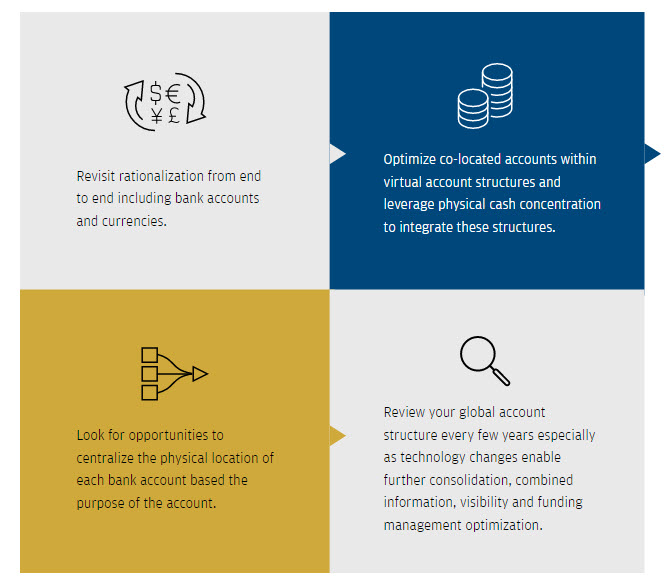
Optimizing working capital is never a static process. Changing market dynamics, regulations, and corporate actions drive changes from minor fine tuning to major rework. For example, rising market rates increase the carry cost of excess working capital. Negative market rates provide the challenge of reducing working capital principle. Local regulations can also significantly reduce working capital mobility. In addition, recent tax and trade policy changes may result in changes to corporate structures as well as working capital structures.
Thankfully advancements in technology have created new tools which are becoming available globally to help treasurers improve efficiency amid this complexity. However, knowing how to connect both the new and existing liquidity management tools in an integrated manner will help you extract the most value from your working capital.
-
Revisit Local Account Rationalization
One new tool that complements existing in-country account structures are virtual accounts. Virtual accounts now enable companies to revisit rationalization and tackle bank account structures at a higher level. The solution combines one physical bank account and an accounting sub-ledger that mirrors your precise needs for management accounting. Leveraging technology to achieve the desired reporting views allows you to eliminate bank accounts without sacrificing visibility of information. Funding efficiency is inherent to the solution by virtue of maintaining a consolidated cash position through one account relationship.Even though virtual accounts advance account rationalization further than ever before, few companies will achieve running their global business entirely from a single account. As long as there are multiple bank accounts, there are opportunities to improve funding efficiency. Therefore, to achieve optimal liquidity requires you to incorporate other tools into your virtual account solutions.
-
Connect the Corridors
Some in-country accounts are necessary despite the added complexity. A significant mass in a currency may warrant direct market access and an extended working day. Market requirements, such as paying taxes from an in-country account, are another common factor. Given these needs, the next logical step towards funding efficiency is to physically connect accounts, including virtual accounts, to mobilize liquidity. Physical cash concentration has long since automated the complex daily process of centralizing excess cash and replenishing accounts in need of cash. Pairing groups of virtual accounts can reduce the number of physical accounts at the treasury center location.
The need for local accounts would have traditionally required the company’s subsidiary to open up a minimum of two accounts; one in-country and another in the centralized location. Physical cash concentration connects the liquidity between these two accounts with an additional movement to a third account owned by the treasury center. With a virtual account solution, the intermediary account can be eliminated as the cross-border physical cash concentration will automatically connect the local account to the same subsidiaries virtual account. With visibility unimpeded, virtual summary groups can combine the collective activities of a single subsidiary for management reporting without the need to open additional accounts.
Virtual account solutions combined with physical cash concentration improve visibility, simplify liquidity management and automate funding but result in distinct currency positions. As companies increase globally so do the number and materiality of currencies. As long as there are multiple currencies, there are opportunities to improve funding efficiency. -
Make Currencies Fungible
The final step on the path to efficient funding is to optimize currency positions and create fungibility across those currencies. Notional pooling remains an essential liquidity management tool for currency optimization.
Virtual account solutions connect through multi-currency notional pools, which centralizes usable funding without the need to physically convert operational currency positions. Subsidiaries are able to maintain their operating currency, including inter-company invoicing and lending, while treasury benefits from fungible funding sources across the wider company. Complemented by FX solutions, like cross-currency sweeping, the notional pool is flexible to buffer frictional currency needs and works alongside company’s hedging strategies. This allows you to manage with less working capital across operating currencies, and reduce cost by strategically managing physical FX. Looking forward, developments in multi-currency virtual accounts may create opportunities to increase efficiencies at the group level while advancements in self-service will simplify administration.
An integrated toolkit for efficient funding
Virtual accounts mark an evolution in liquidity management and deepen your ability to improve funding efficiency. The ability to transition existing accounts to virtual accounts and back to physical accounts as needs arise, as well as connect virtual accounts to physical cash concentration and notional pools, compounds the benefits of virtual account solutions. As part of an integrated cash optimization tool kit, virtual accounts add a significant degree of flexibility, visibility, and provide greater ease to manage in a rapidly evolving environment.
Rationalization roadmap
Consider the following approach to revisiting rationalization in an integrated manner:

Learn more |
For more information, contact your J.P. Morgan Treasury Representative. |
J.P. Morgan is the marketing name for the Treasury Services business of JPMorgan Chase Bank, N.A. and its affiliates worldwide.
This material is not intended to provide, and should not be relied on for, accounting, legal, regulatory, tax or investment recommendations or treatments. Please consult your own tax, legal, accounting or investment advisors concerning such matters.
The products and services described in this document are offered by JPMorgan Chase Bank, N.A. or its affiliates subject to applicable laws and regulations and service terms. Not all products and services are available in all locations. Eligibility for particular products and services will be determined by JPMorgan Chase Bank, N.A. or its affiliates.
JPMorgan Chase Bank, N.A. at its London Branch is authorised by the Office of the Comptroller of the Currency in the jurisdiction of the U.S.A. Authorised by the Prudential Regulation Authority. Subject to regulation by the Financial Conduct Authority and to limited regulation by the Prudential Regulation Authority. Details about the extent of our regulation by the Prudential Regulation Authority are available from us on request (Firm Reference Number: 124491)
J.P. Morgan AG is authorized and supervised by the German Federal Financial Supervisory Authority (Bundesanstalt fur Finanzdienstleistungsaufsicht-BaFin).
J.P. Morgan Bank Luxembourg S.A. European Bank and Business Center, 6 route de Treves, L-2633, Senningerberg, Luxembourg
R.C.S Luxembourg B10.958 – SWIFT BIC CHASLULX – VAT Number 1972200242
J.P. Morgan Bank Luxembourg S. A. is regulated by the Commission de Surveillance du Secteur Financier (CSSF) and is jointly supervised by the European Central Bank (ECB) and the CSSF, J.P. Morgan Bank Luxembourg S.A. is authorised as a credit institution in accordance with the Law of 5th April 1993.
For Brazil: Ombudsman J.P. Morgan
Telephone: 0800-7700847
Email: ouvidoria.jp.morgan@jpmorgan.com







